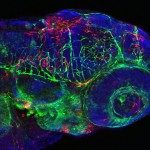Link to Pubmed [PMID] – 9672850
J. Immunother. 1998 Jul;21(4):283-94
We have previously described the production and purification of a murine single-chain, soluble recombinant major histocompatibility complex (MHC) class I molecule (SC-Kd). A similar strategy was devised to produce a recombinant HLA-A2.1 (SC-A2) molecule. The latter was composed of the first three domains of the HLA-A2.1 heavy chain connected to human beta 2-microglobulin through a spacer of 15 amino acids. Immunoaffinity-purified SC-A2 molecules-were correctly folded and biologically functional. They specifically bound HLA-A2-restricted peptides and induced a peptide-specific cytotoxic T lymphocyte (CTL) clone to proliferate and secrete interleukin-2. The ability of murine and human SC-MHC molecules to elicit primary CTLs in vitro was next investigated. When coated in high density onto beads, complexes of antigenic peptide and SC-Kd or SC-A2 molecules efficiently induced a specific primary CTL response in vitro. Furthermore, the structural features of these CTLs were characterized by T cell receptor-beta chain analysis, which revealed rearrangements very similar, if not identical, to those found in CTLs generated by in vivo immunization. Such single-chain, soluble recombinant MHC class I molecules should provide a useful tool in particular for peptide binding assays and for in vitro primary CTL induction to identify immunogenic peptides such as those derived from known tumor-associated antigens.

